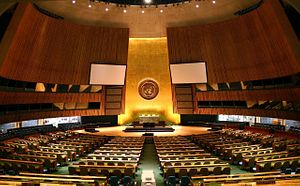In a fitting reply to the diplomatic tirade directed at Pakistan by India and in the aftermath of the heinous attack in Uri, which resulted in the deaths of at least 17 Indian soldiers, Pakistani Prime Minister Nawaz Sharif briefed the 71st United Nations General Assembly on the gross human rights violations in Jammu and Kashmir by India and highlighted how Pakistan had made great strides in tackling terrorism internally.
His speech underlined Pakistan’s victories after launching a domestic operation against terrorist groups that challenged the writ of the state as much as they threatened global as well as a regional security. Sharif’s remarks also marked a departure from Indian Home Minister Rajnath Singh’s comments in the aftermath of the Uri attack, which declared Pakistan a state sponsor of terror.
At the same time, Sharif’s speech was commendable for addressing the castigation directed at Pakistan from its Afghan counterparts as well. Serving as a reminder to the international community, the prime minister reinforced the credit Pakistan should receive for facilitating a negotiated peace process to end Afghanistan’s insurgency and hosting almost three million refugees. In addition, Pakistan’s contribution to peacemaking helped dispel the notion raised by Afghanistan that Pakistan was a threat to regional peace.
In recent days, Pakistan has faced a diplomatic imbroglio after the Uri incident, where its fragile relationship with each of its neighbors, aside from China, came under stress. Since the BJP took over in India after a landslide victory in 2014, the attempted abrogation of Article 370 of the Indian constitution, granting Kashmir special status, has resulted in a massive uprising in the valley against Indian rule as well as a spike in the casualty toll; chief among them was the death of Burhan Wani earlier this summer.
The submissions of dossiers on Indian human rights violations in Kashmir had strengthened Pakistan’s case regarding Kashmir and self-determination. In light of this, Pakistan’s needed to reiterate its stance on the Kashmir issue before the international community. Unsurprisingly, China was outspoken on how the international community should understand Pakistan’s stance on Kashmir.
On the nuclear front, the prime minister managed to highlight India’s arms buildup. As per the logic of maintaining credible minimum deterrence, Pakistan’s signing of the Nuclear Nonproliferation Treaty or the Comprehensive Test-Ban Treaty is conditional upon India taking the lead.
In a nutshell, Pakistan’s response to recent diplomatic stress was both comprehensive and much needed. At the same time however, the lack of emphasis on India’s tactics, which includes the development of the Chabahar Port in Iran as well as India’s involvement in Balochistan, can be considered as points of criticism from a domestic standpoint.
Still, Sharif’s response was desperately needed for a country that is confronting multiple threats and a campaign of castigation for its role in promoting stability in the region.
Hamzah Rifaat is a research associate at the Global Think Tank Network at the National University of Sciences and Technology and was a 2016 South Asian Voices Visiting Fellow at the Stimson Center.

































